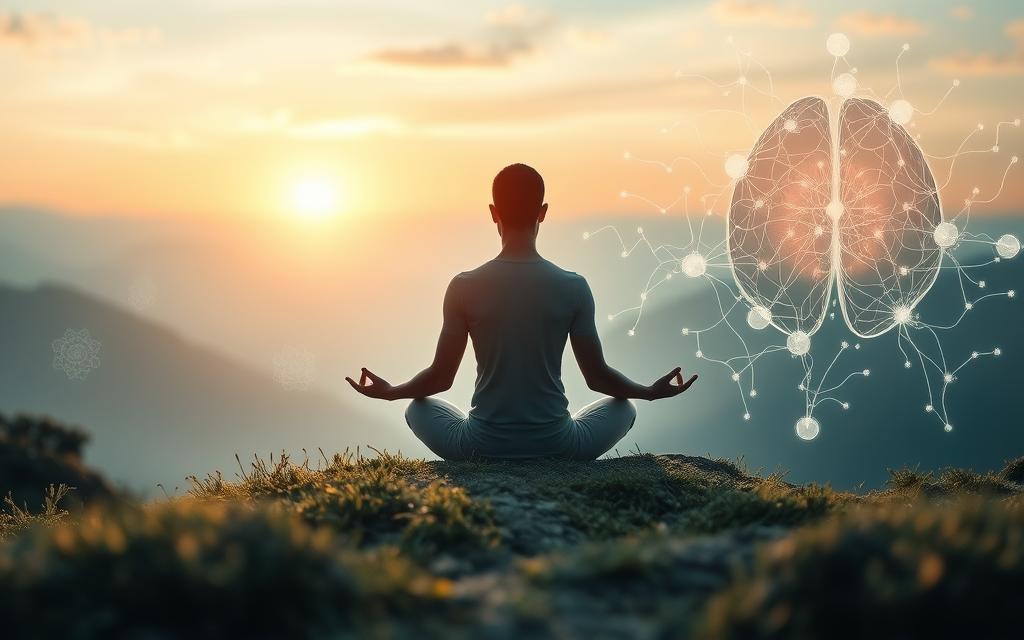In today’s world, stress and anxiety are common. Have you thought about finding true inner peace? Meditation, an ancient practice, might hold the key. But does it really help with depression symptoms? Let’s explore how meditation can transform your mental health.
Understanding the Connection Between Meditation and Mental Health
Meditation’s effect on mental health is truly interesting. Neuroscience has shown how it changes our brain chemistry and structure. This can greatly improve our emotional state.
The Science Behind Meditation’s Impact on Brain Chemistry
Research shows meditation boosts gray matter in key brain areas. These areas are linked to memory, attention, and managing emotions. This change helps our brain adapt and grow over time.
As a result, meditators often think more clearly and are more aware of themselves. They can better control their emotions and thoughts.
How Meditation Affects Mood Regulation
Meditation also affects how we feel by calming the brain’s emotional center. This area is called the amygdala. By soothing it, meditation helps us handle our emotions better.
This leads to less depression and anxiety. We feel more at peace and our mental health improves.
The Role of Mindfulness in Mental Well-being
Mindfulness is a big part of meditation. It means being fully present and accepting in the moment. This mindset helps us understand ourselves better.
It makes us more resilient and adaptable to life’s ups and downs. Meditation is a strong tool for managing our emotions and improving our mental health.

“Meditation is not just a way to calm the mind or reduce stress. It is a profound journey of self-discovery that can transform our relationship with ourselves and the world around us.”
The Ancient Origins of Meditative Practices
Meditation has a long and varied history. It comes from many spiritual traditions and cultural practices around the world. From ancient Vedic texts in India to the contemplative arts of China and Japan, meditation’s roots go back thousands of years.
In India, meditation (dhyana) is key in Hindu, Buddhist, and Jain traditions for thousands of years. The ancient Vedic scriptures from around 3,000 years ago describe meditation techniques. This shows its important role in Indian spiritual and cultural life.
- Archaeologists found meditation in wall art from 5,000 – 3,500 BCE in the Indus Valley. This shows it has been present there for a long time.
- Chinese and Japanese cultures have their own meditation forms, like chan and zazen in Zen Buddhism. These focus on mindful sitting and contemplation to find insight and enlightenment.
Meditation isn’t just for Eastern traditions. Christian practices also include meditation. The Bible mentions it, and the World Community for Christian Meditation was started in 1991.
“Meditation is the dissolution of thoughts in Eternal awareness or Pure consciousness without objectification, knowing without thinking, merging finitude in infinity.” – Voltaire
The meditation history is rich and diverse, coming from many spiritual traditions and cultural practices. As the modern world faces stress and mental health issues, meditation’s ancient wisdom is still valuable. It helps us find inner peace and well-being.

Benefits of Meditation for Depression
Meditation is a powerful tool for managing depression and boosting mental health. It helps reduce stress and anxiety. It also improves emotional control and self-awareness. These benefits can greatly help those with depression.
Reduced Stress and Anxiety Levels
Meditation activates the parasympathetic nervous system. This system promotes relaxation and lowers stress. It offers much-needed relief for those with depression.
Improved Emotional Regulation
Meditation helps people better manage their emotions. It teaches mindfulness. This way, they can spot emotional triggers and control their feelings better.
Enhanced Self-awareness
Meditation boosts self-awareness, helping people understand their thoughts, feelings, and actions. This knowledge empowers them to make better choices. It helps them find control over their mental health.
“Meditation is not just a way to calm the mind, but a powerful tool for self-discovery and personal growth.” – Unknown

Meditation alone may not cure severe depression. But it’s a valuable addition to other treatments. It offers stress relief, anxiety management, and emotional intelligence. These benefits help manage depression and improve overall well-being.
Different Types of Meditation Techniques
Managing depression can be helped by various meditation techniques. Each one meets different needs and preferences. Let’s look at some popular meditation styles:
- Mindfulness meditation focuses on the present moment without judgment. It helps people notice their thoughts, feelings, and body sensations. This way, they can accept and be kind to themselves.
- Guided meditation uses verbal instructions for relaxation and visualization. These sessions can lower stress and anxiety, bringing peace within.
- Mantra meditation repeats a word or phrase to quiet the mind. It helps achieve deep calm by stopping inner chatter.
- Body scan meditation directs attention to body parts, increasing awareness and relaxation.
Exploring these meditation techniques can help those with depression find what works best for them. This can unlock the deep benefits of meditation.

“Mindfulness is a way of befriending ourselves and our experience.” – Jon Kabat-Zinn
Getting Started with Meditation for Depression
If you’re dealing with depression, meditation can be a great help. It can bring inner peace and better mental health. Starting is easy. Just find a quiet spot, set goals, and stick to a routine. This way, you can start feeling better emotionally.
Creating a Meditation Space
Look for a quiet, comfy spot in your home for meditation. It could be a special corner, a cozy chair, or a peaceful outdoor area. Make sure it’s free from distractions and has good air. Lighting a candle or playing soft music can make it even more calming.
Setting Realistic Goals
Start with small goals for your meditation. Begin with 5-10 minutes a day. As you get more comfortable, you can make your sessions longer. The goal is to start small and get better over time.
Building a Consistent Practice
Being consistent is key to a good meditation routine. Try to meditate at the same time every day. Try different techniques like mindfulness, breathing, or body scans to see what works for you. Adding mindfulness to your daily life can also help.
Remember, meditation for depression is a personal journey. Be patient, celebrate your small wins, and trust that regular practice will help your mental health.
“Meditation is not about becoming a different person, a new person, or even a better person. It’s about training in awareness and developing the ability to pay attention.” – Jon Kabat-Zinn
Mindfulness Meditation: A Powerful Tool for Inner Peace
Mindfulness meditation is a powerful practice that brings deep inner peace. It focuses on the present moment and views thoughts and feelings without judgment. This ancient method helps break the cycle of negative thoughts linked to depression.
Research shows mindfulness-based therapy is effective in reducing stress, anxiety, and depression. It improves emotional regulation, cognitive function, and overall well-being. Regular mindfulness practice boosts emotional resilience, reduces negative thinking, and increases calmness.
“Mindfulness is the aware, balanced acceptance of the present experience. It isn’t more complicated than that. It is opening to or receiving the present moment, pleasant or unpleasant, just as it is, without either clinging to it or rejecting it.”
– Sylvia Boorstein
Mindfulness meditation helps develop present moment awareness. It trains the mind to stay in the now, freeing us from negative thoughts. Non-judgmental observation of thoughts and emotions leads to better self-understanding and coping skills.
Adding mindfulness exercises to daily life can greatly improve mental health. There are many ways to practice mindfulness, from deep breathing to guided meditations. Exploring different practices helps find what works best for each person, creating a lasting and meaningful meditation routine.

The journey of mindfulness meditation is about patience, kindness, and curiosity. Embracing the present moment and viewing thoughts and emotions with openness unlocks the power of inner peace.
Incorporating Breathing Techniques for Emotional Balance
Breath awareness and diaphragmatic breathing are key to emotional balance and relaxation. By adding these breath awareness and diaphragmatic breathing to your meditation, you unlock deep peace. This is thanks to the power of relaxation techniques.
Deep Breathing Exercises
Deep breathing is a top breath awareness method. It involves slow, deep breaths that make your belly rise and fall. This diaphragmatic breathing starts the body’s relaxation response, lowering stress and anxiety. Doing deep breathing regularly calms both your mind and body.
Rhythmic Breathing Patterns
Using rhythmic breathing patterns also helps with emotional balance. Try square breathing (inhale for 4 counts, hold for 4 counts, exhale for 4 counts, hold for 4 counts) or alternate nostril breathing. These can help control your nervous system and bring calm. Try different breath awareness methods to find what works best for you.
Adding these breath awareness and diaphragmatic breathing practices to your day can help manage stress. It can also improve your mood and emotional balance.

“The breath is the bridge between the body and the mind. By focusing on our breath, we can find the path to inner peace and emotional balance.”
The Role of Guided Meditation in Depression Management
Guided meditation is a strong tool for managing depression. It offers a structured way to meditate, making it easier for beginners and those with mental health issues. These sessions use visualization techniques and positive affirmations to change negative thoughts and improve mood.
Many meditation apps and online platforms have guided meditations for depression and anxiety. These audio-guided meditation sessions help find inner peace and emotional balance when times are tough.
“Meditation has been shown to reduce stress, anxiety, and depressive symptoms, making it a valuable adjunct therapy for individuals dealing with mental health challenges.”
Guided meditation is great for those new to meditation. It guides you through calming exercises like focusing on breath and body scans. This can help you become more aware of yourself and develop ways to handle depression.

Adding guided meditation to a treatment plan for depression can be very effective. It works well with other treatments and lifestyle changes to bring long-lasting mental well-being.
Building Emotional Resilience Through Regular Practice
Building emotional resilience is key to managing depression and life’s ups and downs. Regular meditation can be a powerful tool. It helps people develop coping mechanisms and strengthen their mental strength.
Developing Coping Mechanisms
Mindfulness and meditation teach people to handle tough emotions better. This emotional intelligence lets them deal with stress in a smarter way. It helps them build the resilience to face life’s challenges.
Strengthening Mental Fortitude
Regular meditation teaches a calm way to deal with thoughts and feelings. This is vital for psychological resilience. It helps avoid getting caught up in negative emotions.
Adding meditation to your daily routine can change your life. It builds emotional resilience and mental strength. This unlocks new levels of emotional intelligence and well-being.
“Resilience is not something that you just have. It’s something that you can build and develop.” – Sheryl Sandberg
Combining Meditation with Other Mental Health Practices
Meditation is a great tool for managing depression, but it’s even better when used with other practices. Combining meditation with cognitive behavioral therapy (CBT) and lifestyle changes can boost its benefits. This holistic approach helps improve overall wellbeing.
Cognitive Behavioral Therapy (CBT) helps people change negative thought patterns. When paired with meditation, it enhances self-awareness and emotional control. This combo helps manage depression better.
Lifestyle changes like exercise, a healthy diet, and enough sleep also support mental health when paired with meditation. Research shows that mixing physical activity with mindfulness training can beat either alone in reducing depression, anxiety, and stress. This approach strengthens emotional resilience and aids in long-term recovery.
“Incorporating meditation into a comprehensive mental health plan can empower individuals to take a proactive role in their wellbeing and unlock new pathways to healing.”
Finding the right mix of practices is key. Mental health experts can help tailor a plan that includes meditation, other therapies, and lifestyle changes. This holistic approach unlocks meditation’s full potential for mental health.
Overcoming Common Meditation Challenges
Meditation can change our lives, but it comes with its own set of challenges. Two big hurdles are dealing with racing thoughts and finding time to meditate regularly. But, with the right mindset and techniques, we can beat these obstacles.
Dealing with Racing Thoughts
It’s normal for our minds to wander during meditation. This is true, even when we’re trying to quiet our thoughts. Instead of getting upset, we can learn to label our thoughts as they pop up. This simple trick helps us watch our thoughts without getting lost in them.
Another good strategy is to use a mantra or a special phrase. This helps keep our focus on track, gently bringing us back when we drift off.
Managing Time Constraints
Finding time to meditate in our busy world can be tough. The solution is to start small and slowly increase our meditation time. Even just 5-10 minutes a day can be very beneficial.
We can also do mini-meditations throughout the day. For example, take a few deep breaths during your lunch break or when switching between tasks.
Being persistent and patient is key when facing meditation challenges. With a bit of creativity and a willingness to try new things, we can enjoy the benefits of meditation, even with the distractions and busy schedules of today’s world.
“The greatest weapon against stress is our ability to choose one thought over another.” – William James
The Impact of Meditation on Sleep and Recovery
Meditation can greatly improve sleep quality, which is often a problem for people with depression. It helps calm the mind before bed, reducing insomnia and improving sleep patterns. Better sleep also helps with mental recovery and emotional balance, creating a positive cycle for mental health.
Research shows that meditators tend to sleep longer and have less insomnia. Meditation helps control the body’s stress response, reducing stress markers that can disrupt sleep. It brings relaxation and peace, helping to solve sleep issues linked to depression.
Also, better sleep from meditation boosts mental recovery and emotional stability. Quality sleep is key for the brain’s recovery, helping it to remember, process emotions, and recharge. This creates a cycle where better sleep leads to better mental health, and vice versa, improving overall well-being and resilience.
